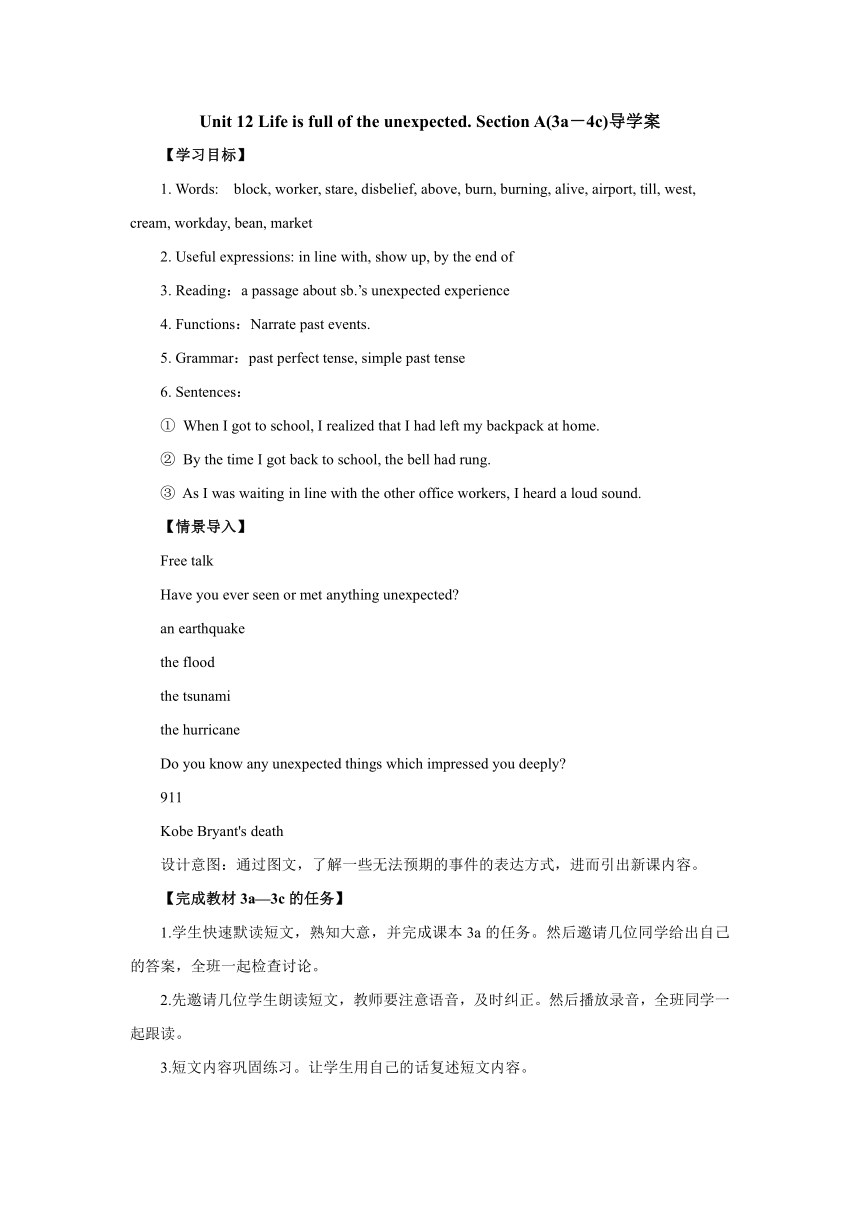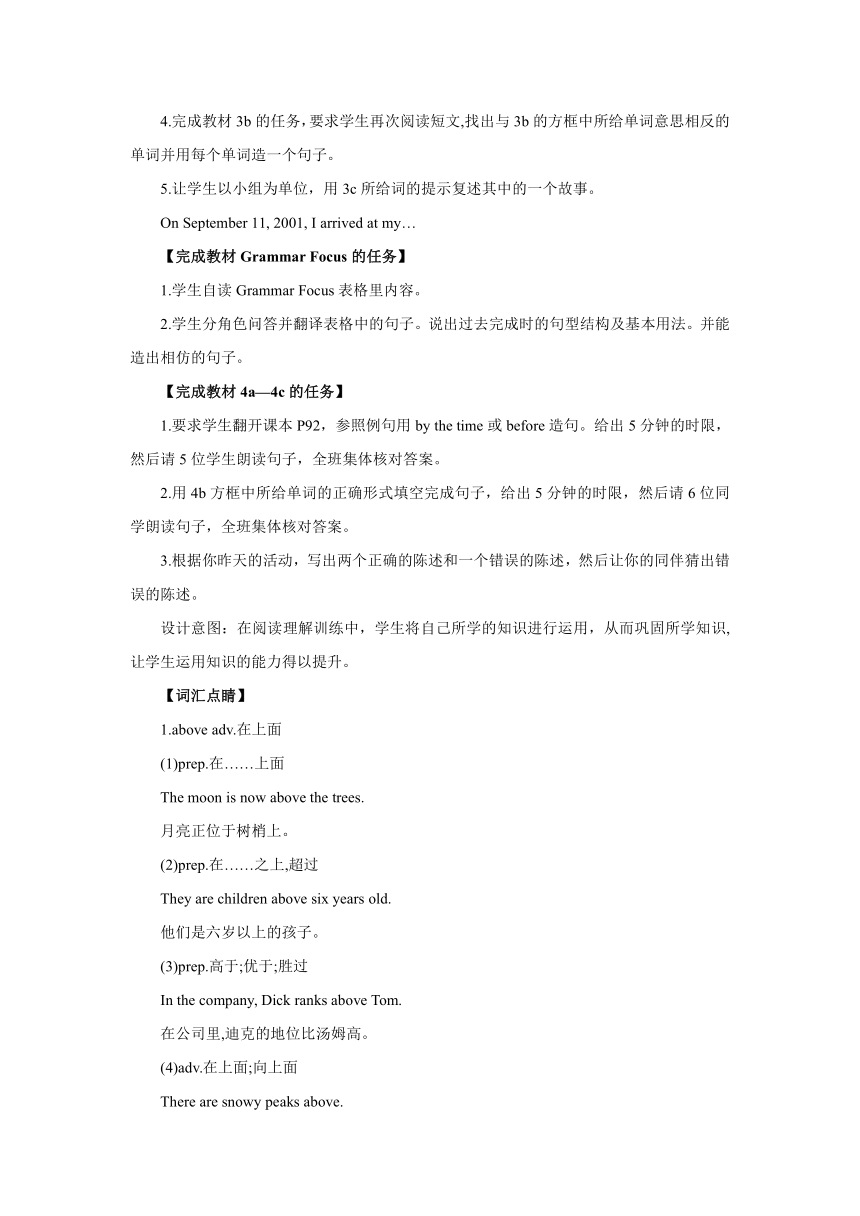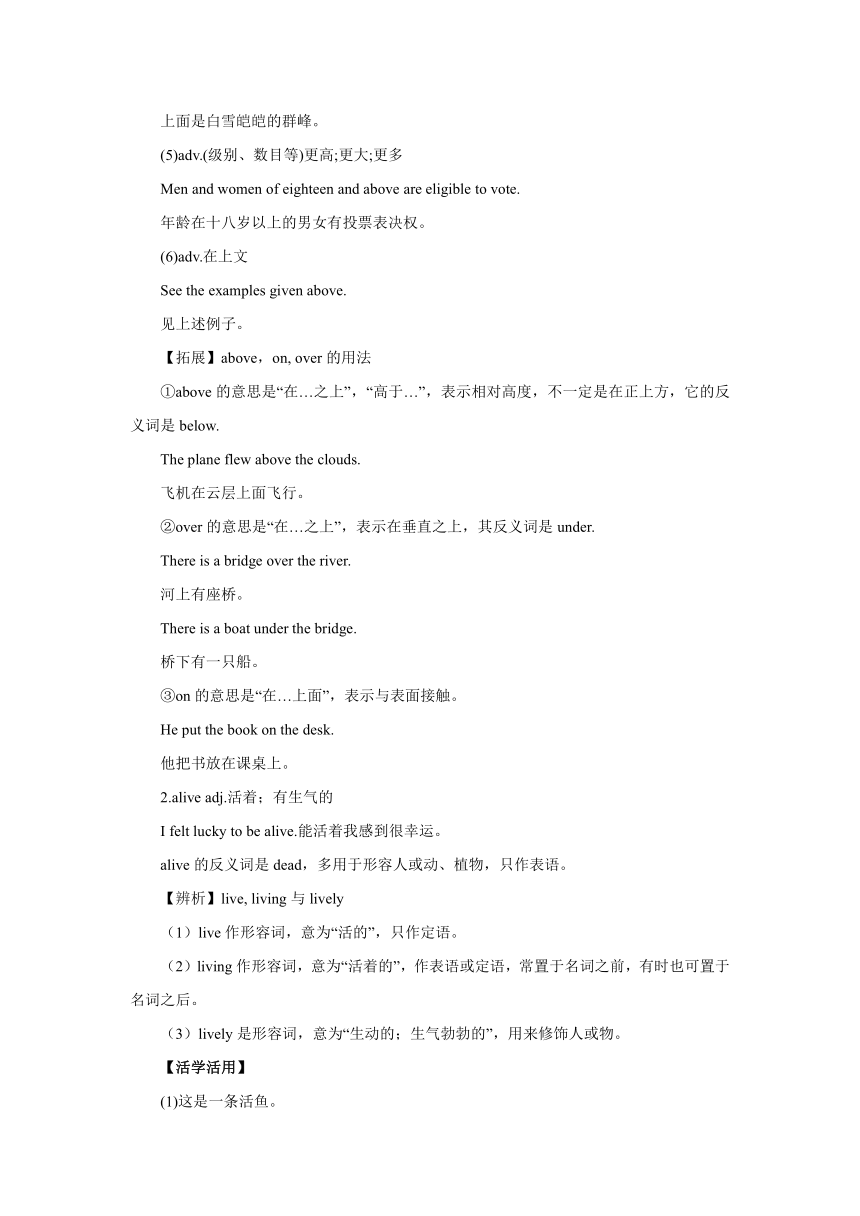人教版九年级英语全册 Unit 12 Life is full of the unexpected_ Section A (3a-4c)导学案
文档属性
| 名称 | 人教版九年级英语全册 Unit 12 Life is full of the unexpected_ Section A (3a-4c)导学案 |  | |
| 格式 | docx | ||
| 文件大小 | 43.8KB | ||
| 资源类型 | 教案 | ||
| 版本资源 | 人教新目标(Go for it)版 | ||
| 科目 | 英语 | ||
| 更新时间 | 2022-11-19 14:53:20 | ||
图片预览



文档简介
Unit 12 Life is full of the unexpected. Section A(3a-4c)导学案
【学习目标】
1. Words: block, worker, stare, disbelief, above, burn, burning, alive, airport, till, west, cream, workday, bean, market
2. Useful expressions: in line with, show up, by the end of
3. Reading:a passage about sb.’s unexpected experience
4. Functions:Narrate past events.
5. Grammar:past perfect tense, simple past tense
6. Sentences:
① When I got to school, I realized that I had left my backpack at home.
② By the time I got back to school, the bell had rung.
③ As I was waiting in line with the other office workers, I heard a loud sound.
【情景导入】
Free talk
Have you ever seen or met anything unexpected
an earthquake
the flood
the tsunami
the hurricane
Do you know any unexpected things which impressed you deeply
911
Kobe Bryant's death
设计意图:通过图文,了解一些无法预期的事件的表达方式,进而引出新课内容。
【完成教材3a—3c的任务】
1.学生快速默读短文,熟知大意,并完成课本3a的任务。然后邀请几位同学给出自己的答案,全班一起检查讨论。
2.先邀请几位学生朗读短文,教师要注意语音,及时纠正。然后播放录音,全班同学一起跟读。
3.短文内容巩固练习。让学生用自己的话复述短文内容。
4.完成教材3b的任务,要求学生再次阅读短文,找出与3b的方框中所给单词意思相反的单词并用每个单词造一个句子。
5.让学生以小组为单位,用3c所给词的提示复述其中的一个故事。
On September 11, 2001, I arrived at my…
【完成教材Grammar Focus的任务】
1.学生自读Grammar Focus表格里内容。
2.学生分角色问答并翻译表格中的句子。说出过去完成时的句型结构及基本用法。并能造出相仿的句子。
【完成教材4a—4c的任务】
1.要求学生翻开课本P92,参照例句用by the time或before造句。给出5分钟的时限,然后请5位学生朗读句子,全班集体核对答案。
2.用4b方框中所给单词的正确形式填空完成句子,给出5分钟的时限,然后请6位同学朗读句子,全班集体核对答案。
3.根据你昨天的活动,写出两个正确的陈述和一个错误的陈述,然后让你的同伴猜出错误的陈述。
设计意图:在阅读理解训练中,学生将自己所学的知识进行运用,从而巩固所学知识,让学生运用知识的能力得以提升。
【词汇点睛】
1.above adv.在上面
(1)prep.在……上面
The moon is now above the trees.
月亮正位于树梢上。
(2)prep.在……之上,超过
They are children above six years old.
他们是六岁以上的孩子。
(3)prep.高于;优于;胜过
In the company, Dick ranks above Tom.
在公司里,迪克的地位比汤姆高。
(4)adv.在上面;向上面
There are snowy peaks above.
上面是白雪皑皑的群峰。
(5)adv.(级别、数目等)更高;更大;更多
Men and women of eighteen and above are eligible to vote.
年龄在十八岁以上的男女有投票表决权。
(6)adv.在上文
See the examples given above.
见上述例子。
【拓展】above,on, over的用法
①above的意思是“在…之上”,“高于…”,表示相对高度,不一定是在正上方,它的反义词是below.
The plane flew above the clouds.
飞机在云层上面飞行。
②over的意思是“在…之上”,表示在垂直之上,其反义词是under.
There is a bridge over the river.
河上有座桥。
There is a boat under the bridge.
桥下有一只船。
③on的意思是“在…上面”,表示与表面接触。
He put the book on the desk.
他把书放在课桌上。
2.alive adj.活着;有生气的
I felt lucky to be alive.能活着我感到很幸运。
alive的反义词是dead,多用于形容人或动、植物,只作表语。
【辨析】live, living与lively
(1)live作形容词,意为“活的”,只作定语。
(2)living作形容词,意为“活着的”,作表语或定语,常置于名词之前,有时也可置于名词之后。
(3)lively是形容词,意为“生动的;生气勃勃的”,用来修饰人或物。
【活学活用】
(1)这是一条活鱼。
This is a ___________ fish.
(2)这条鱼还活着。
The fish is still ___________.
(3)詹妮是一个活泼的女孩。
Jenny is a ___________ girl.
3.miss v.错过;未得到
This is the first holiday I’ve taken in a year, and now I’ve missed my plane.
这是我一年中的第一个假期,现在我已经错过了飞机。
Miss Liu misses her hometown very much.
刘小姐非常相念她的家乡。
miss doing sth.表示“错过做某事”;miss还有“思念;怀念”的意思;miss表示“小姐;女士”。
【活学活用】
(1)她错过了星期六晚上的聚会。
She __________ to the party on Saturday night.
(2)我父亲起床晚了,错过了第一班公交车。
My father got up late and he __________ the first bus.
4.show up 赶到;露面
He didn’t show up at the evening party.
他在晚会上没有出现。
show up一般指按照预定的时间出席、露面。
【拓展】show sb. sth.=show sth.to sb.意为“出示某物给某人”;show sb. around/round sp.意为“带某人参观某处”。
【活学活用】
(1)昨天,吉姆所有的朋友都出席了他的生日聚会。
All of Jim’s friends ______________ on his birthday party yesterday.
(2)让我带你参观一下我们的学校吧。
Let me ______________ our school.
【句型透视】
1.I was about to go up when I decided to get a coffee first.
我正要上去,这时我决定先去喝杯咖啡。
(1)be about to do sth.表示“打算做某事”。
I am about to go shopping this weekend.
我这个周末打算去购物。
(2)when表示叙述前面所没有提到过的信息。它总是对所描述的事件予以强调,意为“这时,突然”。
They were about to leave when it began to snow.他们打算离开时,突然下起了雪。
(3)decide to do sth.表示“决定做某事”。
Have you decided to go to Beijing for a vacation 你决定去北京度假了吗?
【活学活用】
1.单项选择
We were about to have a picnic it began to rain.
A. when B. since C. even though D. as
2.用括号中所给词的适当形式填空
(1)I am about _________(visit) my grandparents this Sunday.
(2)Have you decided _________ (play) football this afternoon
【语法摘要】
过去完成时由“助动词had (用于各种人称和数) + 过去分词”构成,表示某动作或状态在过去某一时间或动作之前已经发生或完成,它表示动作发生的时间是“过去的过去”。
1. 过去完成时的句式结构
(1) 肯定句:主语 + had + 过去分词 + 其他.
(2) 否定句:主语 + hadn’t + 过去分词 + 其他.
(3) 一般疑问句:Had+ 主语 + 过去分词 + 其他
肯定回答:Yes, 主语 + had.
否定回答:No, 主语 + hadn’t.
2.过去完成时的用法
表示在过去某一时间或动作之前已经发生或完成了的动作;表示动作发生在过去的过去。
(2) 过去完成时态常见的引导词有:by the time, when, before, by。
(3) 在含有when, before等引导的时间状语从句的复合句中, 主、从句的动作都发生在过去,且有明显的先后关系,动作在前的用过去完成时,动作在后的用一般过去时。
(4) 常用在said, told, knew, heard, realized等的宾语从句中。
3.一般过去时和过去完成时的区别
一般过去时表示过去某时间发生的动作或存在的状态,而过去完成时则表示过去某一时间以前(即过去的过去)发生的动作或存在的状态。
【学习目标】
1. Words: block, worker, stare, disbelief, above, burn, burning, alive, airport, till, west, cream, workday, bean, market
2. Useful expressions: in line with, show up, by the end of
3. Reading:a passage about sb.’s unexpected experience
4. Functions:Narrate past events.
5. Grammar:past perfect tense, simple past tense
6. Sentences:
① When I got to school, I realized that I had left my backpack at home.
② By the time I got back to school, the bell had rung.
③ As I was waiting in line with the other office workers, I heard a loud sound.
【情景导入】
Free talk
Have you ever seen or met anything unexpected
an earthquake
the flood
the tsunami
the hurricane
Do you know any unexpected things which impressed you deeply
911
Kobe Bryant's death
设计意图:通过图文,了解一些无法预期的事件的表达方式,进而引出新课内容。
【完成教材3a—3c的任务】
1.学生快速默读短文,熟知大意,并完成课本3a的任务。然后邀请几位同学给出自己的答案,全班一起检查讨论。
2.先邀请几位学生朗读短文,教师要注意语音,及时纠正。然后播放录音,全班同学一起跟读。
3.短文内容巩固练习。让学生用自己的话复述短文内容。
4.完成教材3b的任务,要求学生再次阅读短文,找出与3b的方框中所给单词意思相反的单词并用每个单词造一个句子。
5.让学生以小组为单位,用3c所给词的提示复述其中的一个故事。
On September 11, 2001, I arrived at my…
【完成教材Grammar Focus的任务】
1.学生自读Grammar Focus表格里内容。
2.学生分角色问答并翻译表格中的句子。说出过去完成时的句型结构及基本用法。并能造出相仿的句子。
【完成教材4a—4c的任务】
1.要求学生翻开课本P92,参照例句用by the time或before造句。给出5分钟的时限,然后请5位学生朗读句子,全班集体核对答案。
2.用4b方框中所给单词的正确形式填空完成句子,给出5分钟的时限,然后请6位同学朗读句子,全班集体核对答案。
3.根据你昨天的活动,写出两个正确的陈述和一个错误的陈述,然后让你的同伴猜出错误的陈述。
设计意图:在阅读理解训练中,学生将自己所学的知识进行运用,从而巩固所学知识,让学生运用知识的能力得以提升。
【词汇点睛】
1.above adv.在上面
(1)prep.在……上面
The moon is now above the trees.
月亮正位于树梢上。
(2)prep.在……之上,超过
They are children above six years old.
他们是六岁以上的孩子。
(3)prep.高于;优于;胜过
In the company, Dick ranks above Tom.
在公司里,迪克的地位比汤姆高。
(4)adv.在上面;向上面
There are snowy peaks above.
上面是白雪皑皑的群峰。
(5)adv.(级别、数目等)更高;更大;更多
Men and women of eighteen and above are eligible to vote.
年龄在十八岁以上的男女有投票表决权。
(6)adv.在上文
See the examples given above.
见上述例子。
【拓展】above,on, over的用法
①above的意思是“在…之上”,“高于…”,表示相对高度,不一定是在正上方,它的反义词是below.
The plane flew above the clouds.
飞机在云层上面飞行。
②over的意思是“在…之上”,表示在垂直之上,其反义词是under.
There is a bridge over the river.
河上有座桥。
There is a boat under the bridge.
桥下有一只船。
③on的意思是“在…上面”,表示与表面接触。
He put the book on the desk.
他把书放在课桌上。
2.alive adj.活着;有生气的
I felt lucky to be alive.能活着我感到很幸运。
alive的反义词是dead,多用于形容人或动、植物,只作表语。
【辨析】live, living与lively
(1)live作形容词,意为“活的”,只作定语。
(2)living作形容词,意为“活着的”,作表语或定语,常置于名词之前,有时也可置于名词之后。
(3)lively是形容词,意为“生动的;生气勃勃的”,用来修饰人或物。
【活学活用】
(1)这是一条活鱼。
This is a ___________ fish.
(2)这条鱼还活着。
The fish is still ___________.
(3)詹妮是一个活泼的女孩。
Jenny is a ___________ girl.
3.miss v.错过;未得到
This is the first holiday I’ve taken in a year, and now I’ve missed my plane.
这是我一年中的第一个假期,现在我已经错过了飞机。
Miss Liu misses her hometown very much.
刘小姐非常相念她的家乡。
miss doing sth.表示“错过做某事”;miss还有“思念;怀念”的意思;miss表示“小姐;女士”。
【活学活用】
(1)她错过了星期六晚上的聚会。
She __________ to the party on Saturday night.
(2)我父亲起床晚了,错过了第一班公交车。
My father got up late and he __________ the first bus.
4.show up 赶到;露面
He didn’t show up at the evening party.
他在晚会上没有出现。
show up一般指按照预定的时间出席、露面。
【拓展】show sb. sth.=show sth.to sb.意为“出示某物给某人”;show sb. around/round sp.意为“带某人参观某处”。
【活学活用】
(1)昨天,吉姆所有的朋友都出席了他的生日聚会。
All of Jim’s friends ______________ on his birthday party yesterday.
(2)让我带你参观一下我们的学校吧。
Let me ______________ our school.
【句型透视】
1.I was about to go up when I decided to get a coffee first.
我正要上去,这时我决定先去喝杯咖啡。
(1)be about to do sth.表示“打算做某事”。
I am about to go shopping this weekend.
我这个周末打算去购物。
(2)when表示叙述前面所没有提到过的信息。它总是对所描述的事件予以强调,意为“这时,突然”。
They were about to leave when it began to snow.他们打算离开时,突然下起了雪。
(3)decide to do sth.表示“决定做某事”。
Have you decided to go to Beijing for a vacation 你决定去北京度假了吗?
【活学活用】
1.单项选择
We were about to have a picnic it began to rain.
A. when B. since C. even though D. as
2.用括号中所给词的适当形式填空
(1)I am about _________(visit) my grandparents this Sunday.
(2)Have you decided _________ (play) football this afternoon
【语法摘要】
过去完成时由“助动词had (用于各种人称和数) + 过去分词”构成,表示某动作或状态在过去某一时间或动作之前已经发生或完成,它表示动作发生的时间是“过去的过去”。
1. 过去完成时的句式结构
(1) 肯定句:主语 + had + 过去分词 + 其他.
(2) 否定句:主语 + hadn’t + 过去分词 + 其他.
(3) 一般疑问句:Had+ 主语 + 过去分词 + 其他
肯定回答:Yes, 主语 + had.
否定回答:No, 主语 + hadn’t.
2.过去完成时的用法
表示在过去某一时间或动作之前已经发生或完成了的动作;表示动作发生在过去的过去。
(2) 过去完成时态常见的引导词有:by the time, when, before, by。
(3) 在含有when, before等引导的时间状语从句的复合句中, 主、从句的动作都发生在过去,且有明显的先后关系,动作在前的用过去完成时,动作在后的用一般过去时。
(4) 常用在said, told, knew, heard, realized等的宾语从句中。
3.一般过去时和过去完成时的区别
一般过去时表示过去某时间发生的动作或存在的状态,而过去完成时则表示过去某一时间以前(即过去的过去)发生的动作或存在的状态。
同课章节目录
- Unit 1 How can we become good learners.
- Section A
- Section B
- Unit 2 I think that mooncakes are delicious!
- Section A
- Section B
- Unit 3 Could you please tell me where the restroom
- Section A
- Section B
- Unit 4 I used to be afraid of the dark.
- Section A
- Section B
- Unit 5 What are the shirts made of?
- Section A
- Section B
- Review of Units 1-5
- Unit 6 When was it invented?
- Section A
- Section B
- Unit 7 Teenagers should be allowed to choose their
- Section A
- Section B
- Unit 8 It must belong to Carla.
- Section A
- Section B
- Unit 9 I like music that I can dance to.
- Section A
- Section B
- Unit 10 You're supposed to shake hands.
- Section A
- Section B
- Review of Units 6-10
- Unit 11 Sad movies make me cry.
- Section A
- Section B
- Unit 12 Life is full of the unexpected
- Section A
- Section B
- Unit 13 We're trying to save the earth!
- Section A
- Section B
- Unit 14 I remember meeting all of you in Grade 7.
- Section A
- Section B
- Review of Units 11-14
